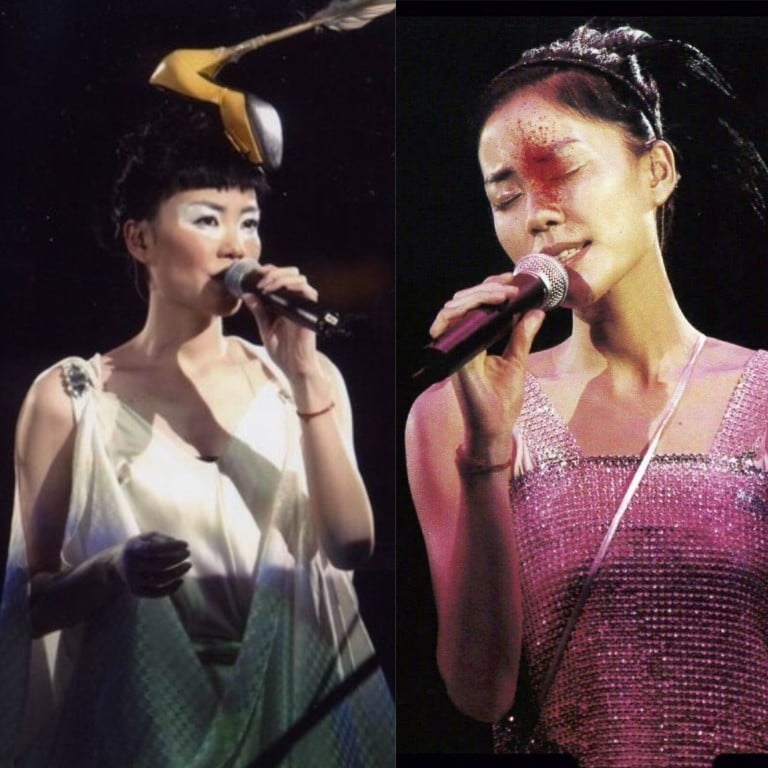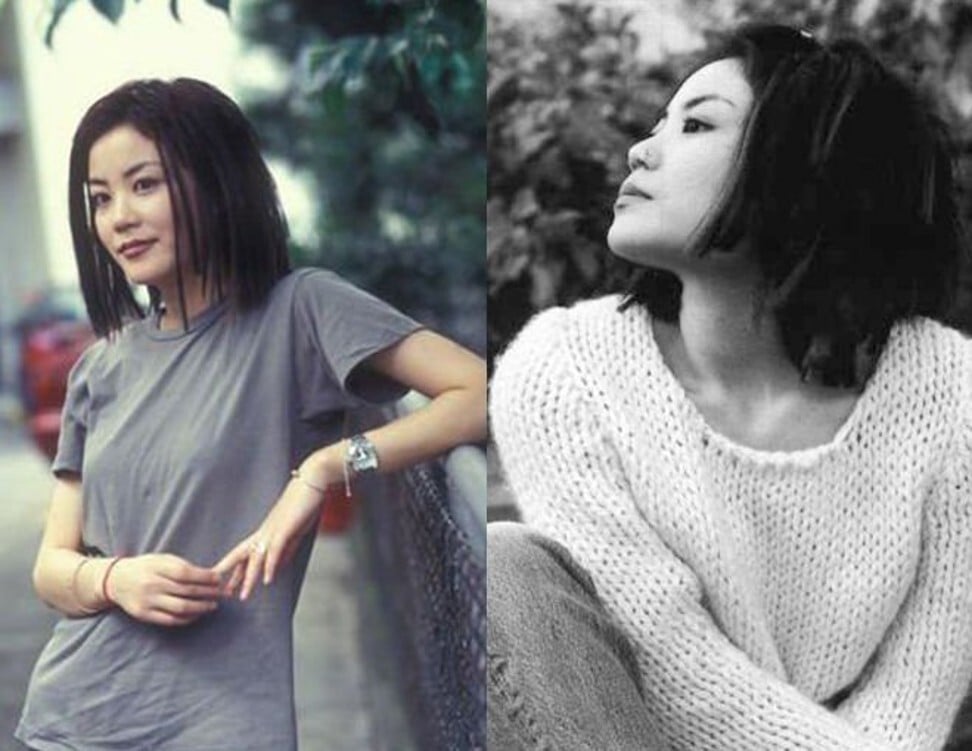Faye Wong’s 18 best songs – from Cantopop to grunge, Chungking Express to Final Fantasy VIII – Hong Kong’s ultimate 90s diva

Faye Wong was the ultimate Hong Kong diva of the 1990s. Her nightingale voice, artistic persistence, indifference to fame and unmistakable style made her one of the city’s most singular celebrities.
While most of us might know her for that cover of The Cranberries’ Dreams, or providing the vocals to Eyes On Me, the ending theme song for Final Fantasy VIII , Wong didn’t hit the big time until her fourth studio album “Coming Home”. After a modelling stint and coming third in a singing competition, Wong had been signed by Cinepoly and came under the tutelage of Tai See-chung, who also trained Hong Kong megastars such as Anita Mui, Aaron Kwok, Andy Lau and Leon Lai.
Canto-pop queen Anita Mui was the ‘Madonna of Asia’

Her original name Wang Fei was considered too mainland-sounding for the Hong Kong market and her record label gave her the name Shirley Wong. However, given the mediocre success of her first three albums, she was sent to New York to undertake vocal training and as a cultural exchange. It was in the Big Apple where the artist found herself, saying in an interview:
“I wandered around, visited museums and sat at cafes. There were so many strange, confident-looking people. They didn't care what other people thought of them. I felt I was originally like that too, independent and a little rebellious. But in Hong Kong I lost myself. I was shaped by others and became like a machine, a dress hanger. I had no personality and no sense of direction.”
It was this realisation that led to her becoming the idol that she is today, a performer who gradually transitioned from Cantopop love ballads to composing alternative tunes for her own albums. While she has taken a step back from the limelight since her second marriage in 2005, here are our favourite songs by the Cantopop queen turned alternative musician.
Hong Kong movie quiz: how many of these 80s classics can you name?
Vulnerable Woman
In 1992, Greed of Man was TVB’s big budget show of the year and is still lauded as one of the network’s best dramas. Faye Wong’s Vulnerable Woman was the music played when the heroine tragically died. The song immortalised the scene in the hearts of viewers all over Hong Kong.
No Regrets
“No Regrets” was the follow up album to “Coming Home” and it didn’t disappoint. The eponymous single was a huge hit.
Monsoon
Another hit from the “No Regrets” album. A mellow Cantopop number that resounded in the halls of karaoke lounges for years to come.
Summer of Love
“100,000 Whys” is the album where many see Wong coming into her own. Shedding her stage name Shirley, Wong went back to using her given name – Wang Fei – in Chinese and changed her English name to Faye. Her album brought grunge to the Hong Kong public’s consciousness as well as adopting other bold style experiments of the time. Summer of Love was a small step away from the string of ballads she was known for and appealed to her younger fans.
How did Rihanna became the richest female music star in the world?
Cold War
A cover of Tori Amos’ Silence of the Year with lyrics beautifully adapted by Albert Leung. Amos’ vocals weren’t easy to replicate and Wong was able to apply her style while staying true to the original.
Pledge
The Beatles’ “White Album” was considered to one of their best as well as being one of their more experimental. For Wong’s fans, her choice to issue the “Random Thoughts” album in white with the words embossed in cream, came to feel similarly pivotal. Covering two songs by the Cocteau Twins, this album was Wong’s first move into alternative rock. Pledge is the first song she wrote alongside her then partner and eventual husband Dou Wei and was the first original Mandarin song to be featured on tracklists.
Dream Lover
Wong’s cover of The Cranberries’ Dream is a landmark due to the fact that she adapted lead singer Dolores O'Riordan’s vocal style of keening and yodelling thereafter. The song was featured in Wong Kar-wai’s much acclaimed feature film, Chungking Express, which Wong also starred in, catapulting her into the international spotlight.
How In the Mood for Love became a modern masterpiece – 20 years on
Sleepwalk
This song showcased Faye Wong growing into her adopted style, using a slight yodel in the intro to this original score by C.Y. Kong.
Honeymoon
The next album, “Please Myself”, while not as much of a commercial success as “Random Thoughts”, included this hit single, and also the title track and Exit on the tracklist, all self-penned by Wong.
Angel
The year 1994 was a prolific one for Wong as not only did she release two Cantonese albums but a Mandarin one as well, with translated works and a few original scores. Angel continued Wong’s experiment with alternative music and was also the theme song of the fantasy film, Mermaid Got Married.
10 of Andy Lau’s best films
Brink of Love and Pain
The ballad that anchored the “Please Myself” album was one of the last conventional Cantopop songs by the pop diva and began the divide between her own musical style, and commercial and mainstream tastes.
Di-Dar
Di-Dar was featured number 27 in Ming Pao Weekly's list of “40 Classic Cantopop Albums of the Last 40 Years” in 2008. Music journalist Fung Lai-chee described it as “the best psychedelic and bestselling avant-garde work in Cantopop, with songs that are self-centred, ignoring [the] market and others' work.”
Ambiguous
This ballad was written to appeal to the mass market and is a favourite among Wong’s fans.
K-pop queens release new music to chase away the coronavirus blues
Anxiety
Considered one of the riskiest albums of Wong’s to date, this album falls squarely in the alternative category. Many of the songs didn’t include proper lyrics – a cardinal sin in the age of karaoke – and it wasn’t well-received by the mainstream market at the time. However this album scores high in listenability and deserves more of an audience.
Eyes on Me
It was a matter of national pride when Wong provided the vocals for the ending theme for arguably one of the most popular RPG games of the 1990s, Final Fantasy VIII. It was the era just before streaming took off and YouTube even existed so scores of fans forged ahead to finish the game, solely to arrive at the end credits to hear the song.
Hundred Years of Solitude
The “Lovers & Strangers” album was one of Wong’s bestselling albums and after its release in 1999, Guinness World Records declared Faye Wong the best selling female Cantopop artist of all time. It was also the beginning of Wong’s departure from prioritising the Hong Kong market and releasing more and more songs in Mandarin, her mother tongue.
Chanel
Wong established herself more clearly as a songwriter by penning five of the songs on the tracklist of the “Fable” album. Her singing style had matured and moulded itself to her style of songwriting while she pushed at the boundaries of popular music.
Withered Flower
“To Love”, released in 2003. was the last of Wong’s studio albums to date and Withered Flower the last Cantonese song she has presented to her Hong Kong fans.
Want more stories like this? Sign up here. Follow STYLE on Facebook, Instagram, YouTube and Twitter .

From her Chinese-language covers of The Cranberries, Tori Amos and Cocteau Twins to her iconic statement album Di-Dar, Pledge and 100,000 Whys, Faye Wong left an enduring mark on the Asian music scene – strafing from alternative Western styles to big balling ballads, and embracing Cantonese before returning to her native Mandarin